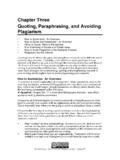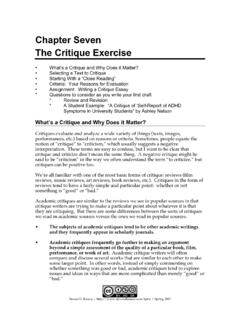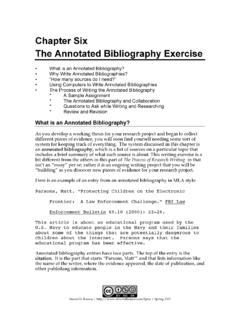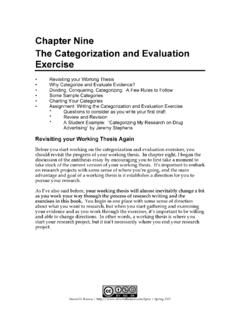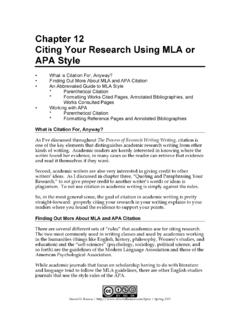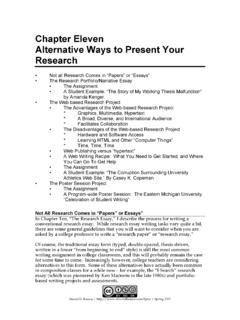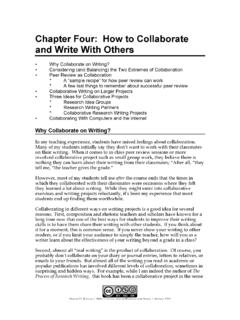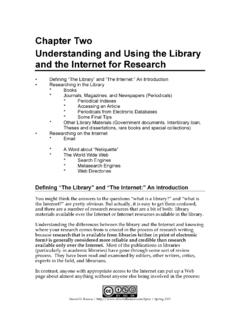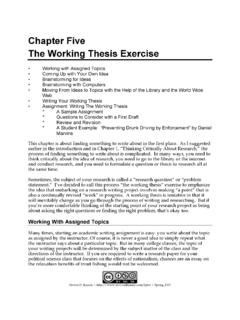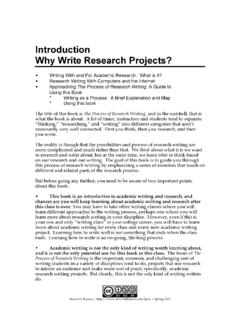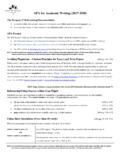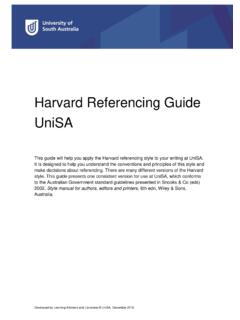Transcription of Introduction Part I: The Elements of Research Chapter One ...
1 Introduction Part I: The Elements of Research Chapter One Thinking Critically About Research What is Research and Why Should I Use It? What s Different about Academic Research ? Primary versus Secondary Research Scholarly versus Non-Scholarly Sources Sources that are Both Scholarly and Non-Scholarly? The Internet: The Researcher s Challenge Evaluating the Quality and Credibility of Your Research Complicating Factors in Evaluating the Credibility of Internet Research Chapter Two Understanding and Using the Library and the Internet for Research Defining The Library and The Internet: An Introduction Researching in the Library * Books * Journals, Magazines, and Newspapers (Periodicals) * Periodical Indexes * Accessing an Article * Periodicals from Electronic Databases * Some Final Tips * Other Library Materials (Government documents, Interlibrary loan, Theses and dissertations, rare books and special collections) Researching on the Internet * Email * A Word about Netiquette * The World Wide Web * Search Engines * Metasearch Engines * Web Directories Chapter Three Quoting, Paraphrasing, and Avoiding Plagiarism How to Summarize: An Overview How to Quote and Paraphrase.
2 An Overview When to Quote, When to Paraphrase Four Examples of Quotes and Paraphrases How to Avoid Plagiarism in the Research Process Plagiarism and the Internet Chapter Four How to Collaborate and Write With Others Why Collaborate on Writing? Considering (and Balancing) the Two Extremes of Collaboration Peer Review as Collaboration * A sample recipe for how peer review can work * A few last things to remember about successful peer review Collaborative Writing on Larger Projects Three Ideas for Collaborative Projects * Research Idea Groups * Research Writing Partners * Collaborative Research Writing Projects Collaborating With Computers and the Internet Part II.
3 Exercises in the Process of Research Chapter Five The Working Thesis Exercise Working with Assigned Topics Coming Up with Your Own Idea Brainstorming for Ideas Brainstorming with Computers Moving From Ideas to Topics with the Help of the Library and the World Wide Web Writing Your Working Thesis The Process of Writing The Working Thesis * A Sample Assignment * Questions to Consider with a First Draft * Review and Revision * A Student Example: Preventing Drunk Driving by Enforcement by Daniel Marvins Chapter Six The Annotated Bibliography Exercise What is an Annotated Bibliography? Why Write Annotated Bibliographies? How many sources do I need? Using Computers to Write Annotated Bibliographies The Process of Writing the Annotated Bibliography * A Sample Assignment * The Annotated Bibliography and Collaboration * Questions to Ask while Writing and Researching * Review and Revision Chapter Seven The Critique Exercise What s a Critique and Why Does it Matter?
4 Selecting a Text to Critique Starting With a Close Reading An Example of a Close Reading Criteria: Your Reasons for Evaluation The Process of Writing the Critique * A Sample Assignment * Questions to consider as you write your first draft * Review and Revision * A Student Example: A Critique of Self-Report of ADHD Symptoms in University Students by Ashley Nelson Chapter Eight The Antithesis Exercise Revisiting the Working (and inevitably changing) Thesis Why Write an Antithesis Essay? Generating Antithetical Points in Five Easy Steps Finding Antithetical Points on the Internet Strategies for Answering Antithetical Arguments But You Still Can t Convince Assignment: Writing the Antithesis Essay * Questions to consider as you write your first draft * Revision and Review * A Student Example: Are Casinos Good for Las Vegas?
5 Defending Legalized Gambling, by Kerry Oaks Chapter Nine The Categorization and Evaluation Exercise Revisiting your Working Thesis Why Categorize and Evaluate Evidence? Dividing, Conquering, Categorizing: A Few Rules to Follow Some Sample Categories Charting Your Categories Assignment: Writing the Categorization and Evaluation Exercise * Questions to consider as you write your first draft * Review and Revision * A Student Example: Categorizing My Research on Drug Advertising by Jeremy Stephens Part III: The Research Project Chapter Ten The Research Essay A Research Essay Instead of A Research Paper Getting Ready: Questions to Ask Yourself About Your Research Essay Creating and Revising a Formal Outline The Introduction Giving Your Readers Background Information Weaving in Evidence to Support Your Points Accounting for the Opposition: Antithetical Arguments Conclusions Works Cited/Bibliography Chapter Eleven Alternative Ways to Present Your Research Not all Research Comes in Papers or Essays The Research Portfolio/Narrative Essay The Assignment A Student Example: The Story of My Working Thesis Malfunction by Amanda Kenger.
6 The Web-based Research Project The Advantages of the Web-based Research Project * Graphics, Multimedia, Hypertext * A Broad, Diverse, and International Audience * Facilitates Collaboration The Disadvantages of the Web-based Research Project * Hardware and Software Access * Learning HTML and Other Computer Things * Time, Time, Time Web Publishing versus hypertext A Web Writing Recipe: What You Need to Get Started, and Where You Can Go To Get Help The Assignment A Student Example: The Corruption Surrounding University Athletics Web Site, By Casey K. Copeman The Poster Session Project The Assignment A Program-wide Poster Session: The Eastern Michigan University Celebration of Student Writing Chapter 12 Citing Your Research Using MLA or APA Style What is Citation For, Anyway?
7 Finding Out More About MLA and APA Citation An Abbreviated Guide to MLA Style * Parenthetical Citation * Formatting Works Cited Pages, Annotated Bibliographies, and Works Consulted Pages Working with APA * Parenthetical Citation * Formatting Reference Pages and Annotated Bibliographies
